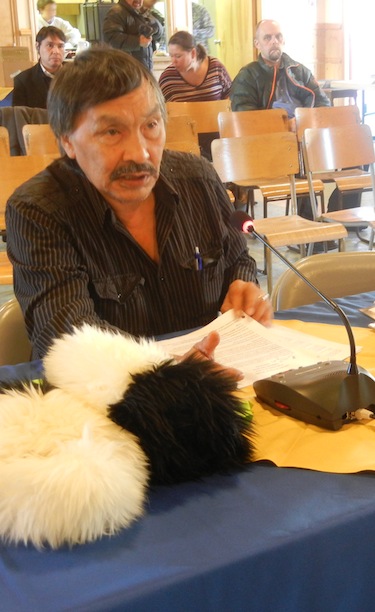Inuit frustration bubbles to the surface at Iqaluit NTI gathering
Nunavut delegates express anger at lack of control over government policies

Jack Anawak, a vice-president of NTI, says “our Inuit are going through hardships right now. Many go to jail, commit suicide, have mental problems.” NTI must to push the Government of Nunavut for more action and Nunavut-based programs such as treatment centres, he said Oct. 23. (PHOTO BY JANE GEORGE)
At the annual general meeting of Nunavut Tunngavik Inc. in Iqaluit Oct. 23, you didn’t have to look far to find frustration, anger and sadness.
“Civil disobedience” is what delegate Donna Adams of the Kivalliq Inuit Association said Inuit should embrace — because only “extreme” action can help Inuit regain what they’ve lost, Adams said
Otherwise, Inuit won’t be in charge of their future, Adams said.
Other sources of frustration include:
• Polar bears: There are more polar bears than ever seen before, delegates said. Hunters used to hunt polar bears outside the communities, but now they just shoot these “scary” marauders in town — in defense, and then see these nuisance bear kills subtracted from their harvest quotas;
• Invasive animal research methods: delegates complained they were told it was safe to eat polar bears that had been tranquilized for population surveys when it turned out this isn’t the case. Inuit knowledge could provide the same information, without traumatizing or damaging the animals, speakers said;
• Lack of respect for Inuit traditional knowledge about the environment and wildlife, which “we’ve carried to from the ancient past to today,” said James Eetoolook, NTI vice-president;
• Bad government polices: Nurtrition North subsidies may lower prices for products like vegetables, but Inuit don’t bring tomatoes and lettuce when they go out on the land, said NTI delegate Bob Aknavigak of Cambridge Bay;
• Shipping and cruise tourism: The opening of the Northwest Passage due to melting ice means upheaval to local residents, said delegates, citing the visit of the rowdy yacht, the Fortrus, to Cambridge Bay, and disturbances to animals, like polar bears and other marine animals;
• The shortage of Inuit in frontline positions: Several delegates criticized what they called a low number of Inuit staff at the new territorial correctional centre in Rankin Inlet and low numbers of Inuit involved in correctional services. Inuit elders would have more clout with Inuit inmates, a delegate said; and,
• Inadequate social services for Inuit: Jack Anawak, an NTI vice-president, said “our Inuit are going through hardships right now. Many go to jail, commit suicide, have mental problems.” NTI must to push the Government of Nunavut for more action and Nunavut-based programs such as treatment centres, he said.
Some NTI delegates complained that people from the South, who have never spent a winter in the Arctic, now dictate what Inuit can and can’t do — ”and those people you are talking about don’t even eat country food,” a delegate said.
But, responding to the call for civil disobedience, NTI Cathy Towtongie sounded a note of caution, saying “we have to look at ourselves first.”
Towtongie said that Inuit have to make sure they are in a position of strength before they act and do not open themselves to any criticism about, for example, over-hunting or, in the case of narwhal, using rifles instead of harpoons in traditional hunts.
Towtongie pointed to other paths of action, such as NTI‘s successful defense of trade restrictions on narwhal and cuts to the narwhal quota, which followed negative criticism stemming from a National Geographic story on the narwhal hunt in Arctic Bay.




(0) Comments